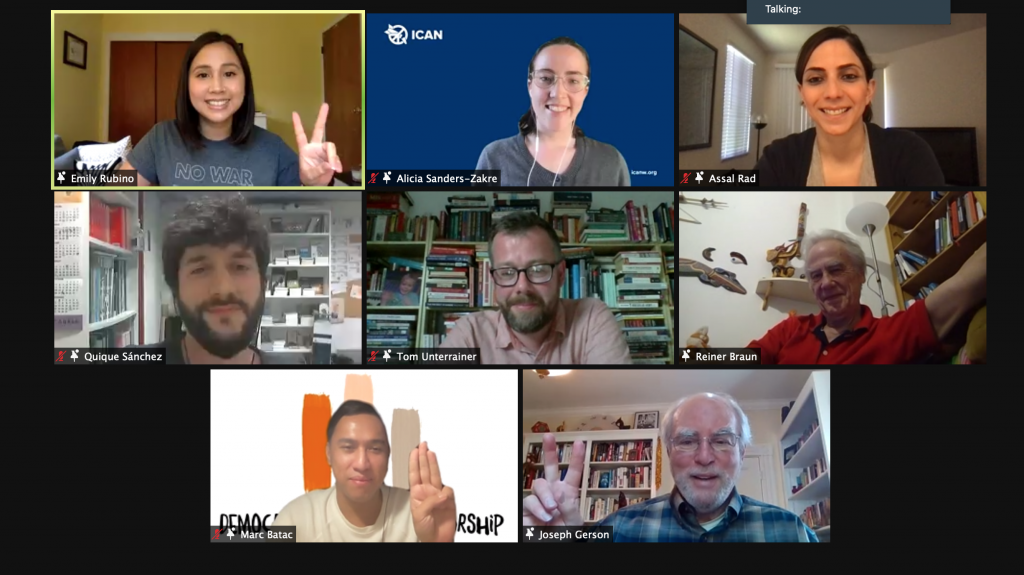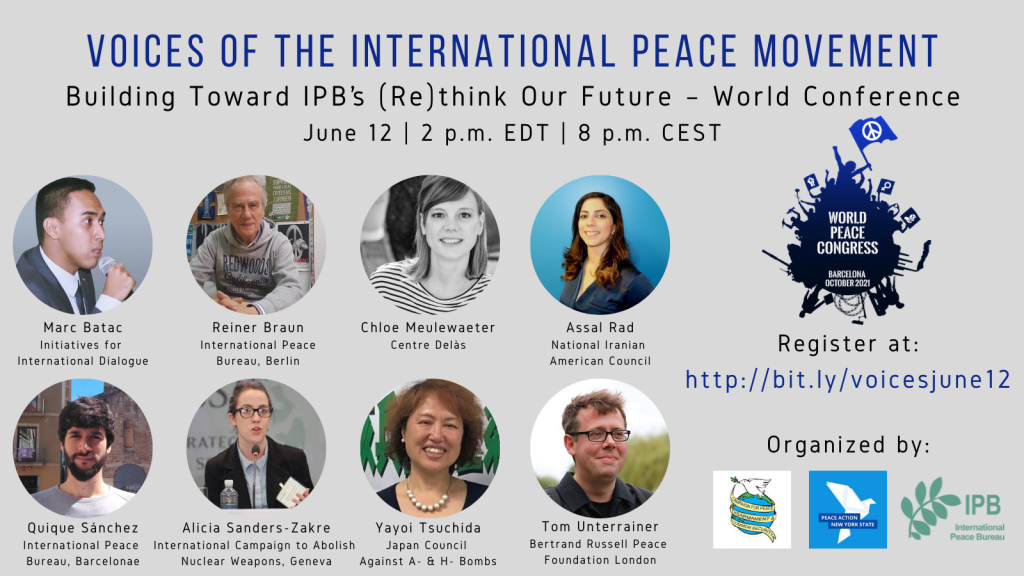Webinar Report: Voices of the International Peace Movement
On June 12, 2021, the Campaign for Peace, Disarmament and Common Security and Peace Action New York State held the webinar “Voices of the International Peace Movement” in preparation for IPB’s Second World Peace Congress, which will be held next October in Barcelona.

You can watch the full conference here.
Among the speakers were Marc Batac, from Initiatives for International Dialogue, Reiner Braun, Executive Director of IPB, Chloé Meulewaeter from Centre Delàs and IPB, Assal Rad, from the National Iranian American Council, Quique Sánchez, from IPB and GCOMS, Alicia Sanders-Zakre, from the International Campaign to Abolish Nuclear Weapons (ICAN), Yayoi Tsuchida, from the Japan Council against A- & H- Bombs, and Tom Unterrainer, from the Bertrand Russell Peace Foundation. The event was moderated by Joseph Gerson, Executive Director of the Campaign for Peace, Disarmament and Common Security, and Emily Rubino, Director of Policy and Outreach at Peace Action New York State.
The first speaker was Reiner Braun, who talked about the Barcelona Peace Congress – Re-Imagine our World: Action for Peace and Justice. Braun emphasized the importance of coming together in order to talk and discuss, share and celebrate, and to exchange hopes and experiences, which are the purposes of the Barcelona Peace Congress. As Reiner Braun stated, the philosophy of the congress is to give hope, to show that we are not helpless in the face of threats, and that we can save the planet and shape the future. As he put it, it is possible to live in solidarity with each other across all borders and differences. Those are the goals of IPB and the content of the Barcelona Peace Congress.
Chloé Meulewaeter, in turn, addressed the rise in military expenditure both globally and by NATO. As Meulewaeter pointed out, the world military expenditure amounted to US$1.98 trillion in 2020 alone, which entails an increase of 2.6% compared to 2019, and a 9.3% increase compared to 2011. According to Meulewaeter, the increase in military expenditure has two direct consequences: first, the more a state spends on the military, the more likely it is to engage in armed conflicts, and secondly, an increase in military spending has a clear impact on the environmental crisis, since all stages of the military economic cycle are linked to specific damages to the environment.
Marc Batac then spoke on how states use solitude and isolation as tools for terror and tyranny, especially during the COVID 19 pandemic. As the quote from Hannah Arendt states: “Terror can rule absolutely only over men who are isolated against each other.” Batac pointed out that this is precisely the environment that some Asian governments have been trying to create: repressing and isolating their citizens by limiting their rights to protest, gather and communicate. However, amidst this rise of impunity and violence, a pan-Asian solidarity movement has been born from the courage, creativity and dynamism demonstrated by Gen Y and Z-led protest movements. This has taken the form of a new collective symbolism, identity and community: the Milk Tea Alliance.
During her intervention, Yayoi Tsuchida showed a deep commitment to the fight against nuclear weapons and the Treaty on their prohibition. She explained that in Japan a campaign was launched to put pressure on the government to ratify, sign and also support the treaty, and noted that in the last UN General Assembly, 130 countries, ⅔ of the UN member States, accepted the resolution on this treaty. Yayoi Tsuchida then emphasized that this is a general fight against the false idea of building world peace through nuclear deterrence.
Alicia Sanders-Zakre spoke about the work of ICAN, and explained that its current focus is on the implementation of the nuclear weapons abolition treaty and on getting other countries to join said treaty. She noted that so far, 86 States have signed it and 54 have committed to do so, and said that a necessary task is also to try to change the perspective of countries with a doctrine based on nuclear weapons, notably NATO member states. Finally, Sanders-Zakre concluded her presentation by recalling that the first meeting of state parties to the UN Treaty on the Prohibition of nuclear weapons will take place at the United Nations Office in Vienna from 12 to 14 January 2022.
Tom Unterrainer then spoke about the G7 meeting, which took place in Cornwall from 11 to 13 June. According to him, the G7 meeting is about redrawing the map of influence and power. He noted that these countries want to ensure that the political and military footprint is asserted, and said that there are several examples of this. Specifically, he referred to the case of the new Atlantic Charter signed by Boris Johnson and Joe Biden, which received a lot of media attention. Unterrainer emphasized that the nuclear threat is still over us and that it is a subject that needs to be discussed urgently. Finally, he took the opportunity to speak about the World Peace Congress in Barcelona as space for debate.
Assal Rad spoke about the Iran nuclear deal, as one of the strongest non-proliferation agreements in the world. Rad noted that the Trump administration’s decision to withdraw from the deal not only undermined what was a diplomatic breakthrough but also what was a breakthrough for non-proliferation. In this regard, she highlighted that when the idea of global peace is politicized, the resulting policies do not actually ensure peace, but rather undermine it. This, according to Rad, is what happened with the GCPOA. The Trump administration decided to politicize something as important as nuclear non-proliferation, withdrew from the deal and now, Iran is accelerating its program. One of the existential crises that we face as a civilization is the threat of nuclear weapons and nuclear war, and tnon-proliferation efforts are one of the cornerstones of any peace movement. In this regard, she said that the hope now, as Vienna talks continue, is that there will be at least a return to the deal, that Iranians will see some sanctions lifted and that we can use that as a model to continue non-proliferation efforts around the world.
Finally, Quique Sánchez spoke about IPB’s World Peace Congress and GCOMS. He reflected on the idea and the need to connect with other social movements to make the Congress a place where civil society organizations and activists from different movements can meet and share ideas in order to get the peace movement to the place where it belongs. In this sense, Sánchez explained that IPB has been trying to connect the dots between different forms of violence and engage in conversations about climate justice, feminism or anti-racism as key parts of the peace movement. Additionally, Sánchez spoke about military spending, noting that there is a huge amount of resources being allocated to the military that could instead be dedicated to human and common security. In order to exemplify this, he displayed GCOMS’ latest infographic, which shows what the almost 2 trillion $ dedicated to the military in 2020 could have funded instead, i.e. SDGs, confronting the COVID-19 pandemic or climate change. Sánchez concluded his intervention by inviting all participants to attend IPB’s Congress next October in Barcelona.




